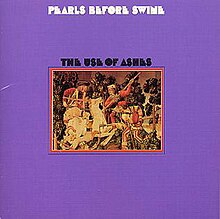The Use of Ashes
| The Use of Ashes | ||||
|---|---|---|---|---|
 |
||||
| Studio album by Pearls Before Swine | ||||
| Released | August 1970 | |||
| Recorded | March 1970 Impact Sound, NY and Woodland Studios, Nashville, TN |
|||
| Genre | psychedelic rock, folk rock | |||
| Length | 32:06 | |||
| Label | Reprise RS 6405 | |||
| Producer | Peter H. Edmiston | |||
| Pearls Before Swine chronology | ||||
|
||||
| Professional ratings | |
|---|---|
| Review scores | |
| Source | Rating |
| Allmusic | |
The Use Of Ashes was the fourth album made by American psychedelic folk group Pearls Before Swine, and the second on Reprise Records after their move from ESP-Disk.
After recording the album These Things Too, the other original founding members of Pearls Before Swine had all left, and leader Tom Rapp and his then wife Elisabeth moved to her home country of the Netherlands (travelling on the maiden voyage of the QE2 liner) to live for several months near Utrecht. Most of the songs on The Use Of Ashes were written there. They were recorded back in Nashville in March 1970, with some of the city's top session musicians, many of whom formed the basis of the band Area Code 615.
Many of Rapp's admirers regard this, and particularly the first side of the original LP (tracks 1 through 5), as the finest and most consistent of all his albums.
The opening track, "The Jeweler", with its refrain of "He knows the use of ashes / He worships God with ashes", came to him when he saw his wife cleaning a piece of jewelry with a paste made from ashes, and is generally regarded as one of his finest and most poetic songs. A version was later recorded by This Mortal Coil. The next track, "From the Movie of the Same Name" is largely instrumental, featuring David Briggs' harpsichord and, like all the tracks, is beautifully and sensitively arranged. "Rocket Man" is based on the Ray Bradbury story "The Rocket Man" (in his book "The Illustrated Man") about an astronaut and father burning up in space, but also draws on Rapp's difficult relationship with his own father and the fact that, in his teens, he lived near Cape Canaveral in Florida. The song itself inspired Bernie Taupin's lyrics on Elton John's hit of the same title. Another highlight, "Song About A Rose", again shows Rapp's ability to convey metaphysical thoughts within an artfully arranged song, with the lyrics "And even God can only guess why or where or when or if the answers all belong / And you and I we sing our song about a rose / Or perhaps the shadow of a rose".
...
Wikipedia
